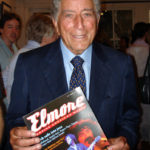Fittingly enough for these times, the Philadelphia area got a therapeutic dose of Mental Illness when Aimee Mann came through at the start of her spring tour. The literate songstress’s eighth solo album (no, holiday collections don’t count) is as beautifully, unflinchingly depressing as she’s ever gotten. In front of a warmly appreciative crowd, however, the same material came out more sweet than somber.
We were well set up by Jonathan Coulton, looking like a scruffier, more hipster-ish Ben Folds and singing about self-hating squid, internet cat photos and zombies. His brand of nerdy indie-pop specializes in juggling sad, serious and ridiculous until they’re inseparable—a great complement for Mann, who was happy to join him for a couple songs and some endearingly awkward improv banter. He came back to return the favor for parts of the main act, and the pair’s vocal harmonies were always a delight.
Strumming and swaying in cute pink cowboy boots, Mann spun a 90-minute set that spanned her entire catalogue and seemingly breezed by in a blink. With only a couple songs you might consider obligatory favorites—mainly those award-winning pieces from the Magnolia soundtrack—she was free to mix staples (a stripped-down “4th of July,” the bouncy “Long Shot” and “Labrador”) alongside pleasantly surprising deep cuts like “Little Bombs” and “Borrowing Time.” Two-thirds of Mental Illness went down excellently as well, especially the slinky “Patient Zero.”
If there was some light nervousness between songs, the music showed nothing of the kind (barring one mixed-up verse, which Mann started over with expert smoothness and charming self-deprecation). The quartet was hitting on all cylinders and her bewitching voice was in superb form throughout. The lack of an electric guitar interestingly left Jamie Edwards’ keys to add dashes of psychedelia or cabaret instead. He and bassist/singer Paul Bryan made a particular highlight trading solos on a smoky club-jazz encore of Harry Nilsson’s “One.” Otherwise the low-frills treatments put the exquisitely-crafted songs front and center, just as they deserve, and each one was a treat. As weird and screwed-up as life gets, with music like this to enrich it, we’ve never been so happy to be sad.
—Geno Thackara








Be the first to comment!